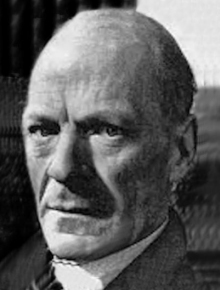Introduction | Life | Work | Books

Gilbert Ryle
(Undated photograph)
|
|
Gilbert Ryle (1900 - 1976) was a 20th Century British philosopher, mainly associated with the Ordinary Language Philosophy movement.
He had an enormous influence on the development of 20th Century Analytic Philosophy, particularly in the areas of Philosophy of Mind and Philosophy of Language.
He was especially well-known for his definitive critique of the Dualism of Descartes (for which he coined the phrase "the ghost in the machine") and other traditional mind-body theories. His form of Philosophical Behaviourism (the belief that all mental phenomena can be explained by reference to publicly observable behavior) became a standard view for several decades.
Ryle was born on 19 August 1900 in Brighton, England, one of ten children in a prosperous family. His father was a doctor but also a generalist who had interests in philosophy and astronomy, and passed on to his children an impressive library, and the young Ryle grew up in an environment of learning.
He was educated at Brighton College and, in 1919, he went to Queen's College, Oxford, initially to study Classics, although he was soon drawn to Philosophy. He graduated with first class honors in 1924 and was appointed to a lectureship in Philosophy at Christ Church, Oxford. He became a tutor a year later, and remained at Christ Church until World War II (and remained at Oxford for his entire academic career until his retirement in 1968).
A capable linguist, Ryle was recruited to intelligence work with the Welsh Guards during World War II, and rose to the rank of Major by the end of the War. He returned to Oxford in 1945 where he was elected Waynflete Professor of Metaphysical Philosophy and Fellow of Magdalen College, Oxford. He was generally regarded as easy-going and sociable and an entertaining conversationalist, but a fierce and formidable debater, unforgiving of pomposity and pretentiousness.
He was president of the Aristotelian Society from 1945 to 1946, and editor of the philosophical journal "Mind" for nearly twenty-five years from 1947 to 1971. He published his principal work, "The Concept of Mind", in 1949.
A confirmed bachelor, he lived after his retirement in 1968 with his twin sister, Mary, in the village of Islip, Oxfordshire. Gardening and walking gave him immense pleasure, as did his pipe (without which he was rarely seen). Ryle died on 6 October 1976 at Whitby in North Yorkshire, after a day's walking on the moors.
In his writing, Ryle had a literary and instantly recognizable style. He is mainly known for his book, "The Concept of Mind" (1949), but he also wrote a collection of shorter pieces called "Dilemmas" (1954), as well as "Plato's Progress" (1966) and "On Thinking" (1979). "The Concept of Mind" in particular was recognized on its appearance as an important contribution to philosophical psychology and Philosophy of Mind, and an important work in the Ordinary Language Philosophy movement.
In his "The Concept of Mind" of 1949, Ryle attacked the body-mind Dualism (the claim that the Mind is an independent entity, inhabiting and governing the body) which has largely permeated Western Philosophy since René Descartes in the 17th Century, rejecting it as a redundant piece of literalism carried over from the era before the biological sciences became established. He dismissed the idea that nature is a complex machine, and that human nature is a smaller machine with a "ghost" in it to account for intelligence, spontaneity and other such human qualities (he referred to Descartes' model as "the dogma of the ghost in the machine").
Ryle believed that the classical theories (whether Cartesian, Idealist or Materialist) made a basic "category-mistake" by attempting to analyze the relation between "mind" and "body" as if they were terms of the same logical category. He argued that philosophers do not need a "hidden" principle to explain the supra-mechanical capacities of humans, because the workings of the mind are not distinct from the actions of the body, but are one and the same. Looked at another way, he characterized the mind as a set of capacities and abilities belonging to the body.
He claimed that mental vocabulary is merely a different way of describing action, and that a person's motives are defined by that person's dispositions to act in certain situations. He concluded that adequate descriptions of human behavior need never refer to anything but the operations of human bodies, which can be seen as a form of Philosophical Behaviourism (also known as Analytical or Logical Behaviourism) which became a standard view among Ordinary Language philosophers for several decades (although more recently it has morphed into a kind of Functionalism).
Ryle also formulated a cartography analogy for his conception of philosophy. He suggested that competent speakers of a language are to a philosopher what simple villagers are to a mapmaker. The villager knows his way around his village well enough for personal and practical purposes, but may not be able to use a map to pinpoint or describe routes to an outsider. In the same way, philosophers should be able to explain and make apparent the meaning of sentences by "mapping" the words and phrases of a particular statement, generating what Ryle called "implication threads", such that each word or phrase of a statement contributes to the statement in such a way that, if the words or phrases were changed, the statement would have a different implication. Philosophy, then, should search for the meaning of these implication threads in the statements in which they are used.
See the additional sources and recommended reading list below, or check the philosophy books page for a full list. Whenever possible, I linked to books with my amazon affiliate code, and as an Amazon Associate I earn from qualifying purchases. Purchasing from these links helps to keep the website running, and I am grateful for your support!
|
